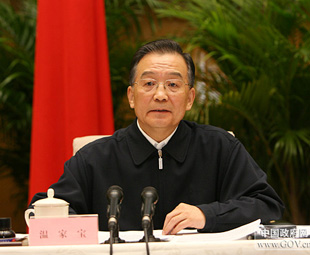Senior government officials held an emergency teleconference on Sunday to discuss the severe power disruptions caused by prolonged snow, rain and cold weather.
Premier Wen Jiabao urged departments concerned to beef up production of coal,electricity ,natural gas and oil products and ensure the smooth transportation of the power products in a bid to guarantee the power supply.
He asked state and local government-owned coal mines to enhance output meanwhile make sure production safety. The production and smooth transportation and sales of natural gas and oil products should also be guaranteed to meet the need of residents and major institutions, Wen stressed.
He noted key enterprises should take on the social responsibilities and departments concerned should strengthen coordination.
Vice-Premier Zeng Peiyan opened the conference by outlining the paralysis of the power network over more than half of the country.
"So far, 17 provinces, municipalities and autonomous regions have suffered blackouts, and power grids in central China's Hubei, Hunan provinces and south China's Guizhou and Guangdong provinces have been seriously damaged," Zeng said.
Tens of thousands of passengers have been stuck on rail lines after electric trains came to a standstill, said Zhang, adding that conditions were worsened to a level that "had seriously affected normal operation of the national economy and the people's lives and production."
Ma Kai, head of the National Development and Reform Commission (NDRC), urged local governments to improve power supply plans so that the electricity could be used as needed.
"In areas already hit by power shortages, high-polluting and over-producing enterprises must have their power strictly limited, and ordinary industrial enterprises should reduce their consumption," Ma said.
"Power demands of homes, hospitals, schools, railways, TV and radio broadcasters, financial systems and other work units concerning the public interest and national security must take priority," he said.
"Other areas should also take measures to save power to ease power strains and balance supply and demand," he said.
Heavy snow since mid-January, the worst in 50 years in central, eastern and southern areas, has affected tens of millions of people, forced the relocation of hundreds of thousands, led to power cuts, collapsed buildings, damaged crops and left thousands of head of livestock dead.
"A 500-kv power tower in Guizhou Province collapsed under mounting snow and the 220-kv transmission network has been largely destroyed, resulting in blackouts in 41 cities and counties," said Wang Yumin, deputy chairman of the State Electricity Regulatory Commission.
"By Jan. 26, there were still 18 500-kv electricity lines in central China's power grid unable to work properly," Wang said, urging departments to accelerate the repair work. Wang warned that the low-voltage power network in some areas may face further damages as snow continues.
China's most southern areas will suffer more rains and snows in the following 10 days, with the precipitation concentrated in two sections of time from Jan. 27 to 28 and from Jan. 31 to Feb. 1, forecast the Central Meteorological Observatory on Sunday.
Railways Minister Liu Zhijun said his ministry had raised the daily coal transport from the planned 34,000 rail trucks to 36,000 from Jan. 26, up 30 percent from a year ago, to help fuel power generators.
The railways, which have reported record passenger numbers as more turn to trains to go home in bad weather for the traditional Spring Festival, managed to deliver 32,700 trucks of coal every day in from Jan. 1 to 25, up 4,481 trucks or 300,000 tons from the same period last year
Liu asked local railway departments to cooperate with coal shipment companies to guarantee unlimited transport of coal for power generation and household use.
Li Shenglin, Minister of Communications, ordered transport companies in southern areas to halt delivery of coal for foreign trade temporarily and recall vehicles to transport coal demanded by domestic thermal power plants if needed.
(Xinhua News Agency January 28, 2008)


